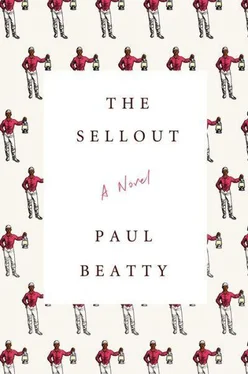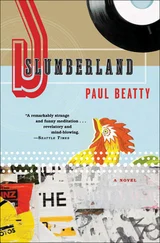Too broke and embarrassed to provide an armed escort, the state of California watched idly as the sacrificial lambs of reintegration, Suzy Holland, Hannah Nater, Robby Haley, Keagan Goodrich, and Melonie Vandeweghe, exited the bus under the protection of not the National Guard but the magic of live television and the loud mouth of Foy Cheshire. It had been a couple of weeks since I’d seen him living out of his car, and from what I’d heard, no one showed up for the last Dum Dum meeting, even though the noted community organizer _ _ r _ _ _ O _ _ _ _ was scheduled to speak.
Shoulders hunched and arms held up protectively in front of their faces, the Dickens Five, as the quintet would come to be known, braced themselves for the pillory of rocks and bottles as they ran the gauntlet and into history. But unlike Little Rock, Arkansas, on September 3, 1957, the city of Dickens didn’t spit in their faces and hurl racial epithets; rather, it begged them for autographs, asked if they already had dates for the junior prom. Yet when the would-be enrollees reached the top of the stairs, there stood Assistant Principal Charisma doing her best Governor Faubus, refusing to budge, her arm ramrod straight against the doorjamb. Hannah, the tallest of the bunch, tried to step around her, but Charisma held firm.
“No Anglos allowed.”
Hominy and I were on the other side of the fray. Standing behind Charisma, and like anyone else apart from the custodial and food services staff at Little Rock Central High School or the University of Mississippi in 1962, on the wrong side of history. Hominy was in school that day to tutor Jim Crow. Charisma had summoned me to read the business letter that accompanied the mailed edition of Foy Cheshire’s latest reimagined multicultural text, Of Rice and Yen , an all-Chinese adaptation of Steinbeck’s classic set in the days of the railroad coolie. The book was a carbon copy of the original text sans articles and with all the l s and r s transposed. Maybe evelybody in whore damn wolrd scaled, aflaid each other. I’ll never understand why after over a half century of Charlie Chan’s Number One Son, the dude in Smashing Pumpkins, dope-ass music producers, skateboarders, and docile Asian wives married to white guys in hardware store commercials, people like Foy Cheshire still think the yen is Chinese currency and that Asian-Americans can’t pronounce their fucking l s, but there was something unnerving about the message’s hurried scrawl:
Dear Pawn of the Liberal Agenda,
I know that you won’t implement this backbreaking work of swaggering cleverness, but that’s your loss. This book will place me firmly in the autodidactic tradition of authors such as Virginia Woolf, Kawabata, Mishima, Mayakovsky, and DFW. See you this Monday for the first day of school. Class may be on your campus, but you will be auditing my world. Bring a pen, paper, and the nigger-whispering Sellout.
Yours truly,
Foy “Did you know Gandhi beat his wife?” Cheshire
When Charisma asked me why he cited those specific writers, I told her I didn’t know, but neglected to mention that the list was composed solely of novelists who had taken their lives. It was hard to say if the statement was some sort of suicidal ideation, but one could hope. There aren’t many black firsts left these days, and as much as Foy would be a good a candidate for the position of “first black writer to off themselves,” I had to be prepared. If he was indeed an “autodidact,” there’s no doubt he had the world’s shittiest teacher.
Foy stepped to the head of the pack to take over the negotiations, magically producing a small stack of DNA results. Flapping them, not in Charisma’s face, but directly into the lens of the nearest TV camera. “I have here in my hand a list of results that show each one of these children has maternal roots tracing their ancestries back thousands of years to Kenya’s Great Rift Valley.”
“Nigger, whose side you on?”
From inside the unhallowed halls of the school I couldn’t see who was making the inquiry, but it was a good question and, judging from the silence, one for which Foy didn’t have an answer. Not that I knew what side I was on, either. All I knew was that the Bible, conscious rappers, and Foy Cheshire weren’t on my side. Charisma, however, knew where she stood, and with two hands to his chest, she shoved Foy and the children back down the stairs like so many bowling pins. I looked around at the faces on my side of the threshold: Hominy, the teachers, Sheila Clark, each a little bit frightened but full of resolve. Shit, maybe I was on the right side of history, after all.
“I suggest if you want to go to school in Dickens so badly, you wait for that school across the street to open up.”
The prospective white students picked themselves up and turned around to gaze at their forebears, the proud pioneers of the mythical Wheaton Academy. With its pristine facilities, effective teachers, sprawling green campus, there was something undeniably attractive about Wheaton, and the youngsters began gravitating longingly toward their scholastic heaven like angels drawn by lute music and decent cafeteria food, until Foy stepped in front of them. “Don’t be fooled by that graven image,” he yelled. “That school is the root of all evil. It’s a slap in the face of anyone who’s ever stood for equality and justice. It’s a racist joke that mocks the hardworking people of this and all communities by placing a carrot on a stick and holding it up in front of old horses too tired to run. And besides, it doesn’t exist.”
“But it looks so real.”
“Those are the best dreams, the ones that feel real.”
Disappointed but not defeated, the group settled on the patch of grass near the flagpole. It was a multicultural Mexican standoff, black-ass Foy and the white kids in the middle, Charisma and the utopian specter of the Wheaton Academy on either side of them.
They say that during their weekend skin games, young Tiger Woods’s father, in a cheap attempt to rattle his son, would jingle the change in his pocket while his boy was standing over a six-foot putt for the win. The end result was a duffer who’s rarely distracted. I, on the other hand, am easily distracted. Permanently sidetracked, because my father liked to play a game he called After the Fact, where in the middle of whatever I was doing, he’d show me a well-known historical photo and ask, “So what happened next?” We’d be at the Bruins game, and during an important time-out he’d flip the snapshot of Neil Armstrong’s footprint in the lunar dust in front of my face. So what happened next? I’d shrug my shoulders. “I don’t know. He did those Chrysler commercials on television.”
“Wrong. He became an alcoholic.”
“Dad, I think that was Buzz Aldrin…”
“In fact, many historians think he was wasted when he first set foot on the moon. ‘That’s one small step for man, one giant leap for mankind.’ What the fuck does that even mean?”
In the middle of my first Little League game at bat, Mark Torres, a lanky fireballer whose stuff was hard as a teenage erection and, like that first sexual encounter, preternaturally fast, threw me an 0–2 fastball that neither I nor the umpire saw and only presumed to be high and inside because of the windburn across my forehead. My father came storming out of the dugout. Not to impart any batting advice, but to hand me the famous photo of the American and Russian soldiers meeting at the Elbe River, shaking hands and celebrating the de facto end of World War II in the European theater. So what happened next?
“America and the Soviet Union would go on to fight a Cold War lasting nearly fifty years and forcing each country to spend trillions of dollars on self-defense in a pyramid scheme Dwight D. Eisenhower would term the Military Industrial Complex.”
Читать дальше












